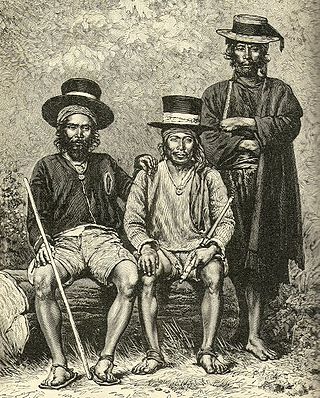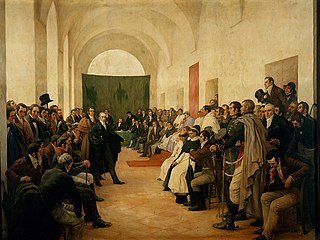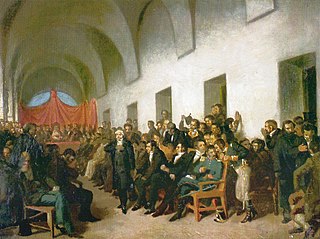
The open cabildo (Spanish: cabildo abierto) is a traditional Hispanic American political action for convening citizens to deliberate policy. Originating in Spanish America as an iteration of the cabildo, it also spread to Spain.

The open cabildo (Spanish: cabildo abierto) is a traditional Hispanic American political action for convening citizens to deliberate policy. Originating in Spanish America as an iteration of the cabildo, it also spread to Spain.
The open cabildo was a special mode of assembly of the inhabitants of Spanish American cities during the colonial period, in cases of emergencies or disasters. Usually, the colonial cities were governed by a cabildo or an ayuntamiento , a municipal council in which most of the officers were appointed by the authorities. In cases of emergency, the cabildo could convene the heads of household ( vecinos ) [1] [2] or a section/all of the citizenry in an "open" cabildo. [3] Typically located at the main church, square, or a member's house, [4] it could be convened in the absence of legal precedent for mobilizing soldiers, announcing taxes, receiving information and communications, and promulgating emergency laws, among other issues. In La ciudad Indiana (1900) by Juan Agustín García , he characterized the open cabildo as a function of communicating orders by the royal government, rarely formulating policy. William Wheatley Pierson Jr. agreed, claiming authoritative weakness as a general fact whilst strength dependent on circumstantial development. [5] Historians Modesto Chávez Franco and Francisco X. Tapia assert meetings were not frequent, with outliers being Zacatecas in the 16th century and Santiago del Estero in the 18th century. [6]
Their composition varied. Ubiquitous constituents were statesmen and clergy, whilst vecinos' consistent inclusion is indeterminate; generally, their participation increased during the later centuries of the colonial period, however "vecino"'s delineation correspondingly decreased. It is also ambiguous as to what extent Spaniards, criollos, mestizos, and the indigenous participated. [7]
Early open cabildos demonstrated some elective power. Following Francisco Pizarro's death, Pedro de Valdivia's appointment to Governor of Chile by a series of open cabildos in May 1541. As permitted by Carlos V, Asunción's open cabildo of vecinos elected the governor from 1548 to 1736, when it was revoked due to their participation in the Revolt of the Comuneros. During the 16th century, those in Spain could elect their alcaldes ; one in Havana exercised similar power until at least 1553, voting on two candidates; in 1603, the body reformed under the pretense of combatting piracy, which was a common recourse. [8]
At the beginning of the Spanish American wars of independence open cabildos played a decisive role were the path by revolutionary movements, acting as organs of popular participation, were able to remove the colonial authorities and establish new revolutionary governments. Such occurred in San Miguel de Tucumán on 21 May 1810, Bogotá 10 July 1810, and Granada, Nicaragua 22 December 1811. [9]

In modern times, some Latin American countries have used the name "open cabildos" for public assemblies convened by municipal governments to decide local matters of public importance. The term is sometimes used for present-day public meetings to make decisions. [10] [11] Some modern versions, while using the historically evocative name, can be more similar to an outdoor rally. [12]
In Venezuela, the open cabildo is one part of a set of provisions required to preserve democracy. Article 70 of the nation's Constitution says that "there [must be] methods for the people to exercise their sovereignty in politics [including] the open forum and assembly of citizens whose decisions will be binding". Because the legally binding vote is tied to the open cabildo, the Constitution may be interpreted to say that the forum can still have the power of a political referendum. [12]

The Spanish colonization of the Americas began in 1493 on the Caribbean island of Hispaniola after the initial 1492 voyage of Genoese mariner Christopher Columbus under license from Queen Isabella I of Castile. These overseas territories of the Spanish Empire were under the jurisdiction of Crown of Castile until the last territory was lost in 1898. Spaniards saw the dense populations of indigenous peoples as an important economic resource and the territory claimed as potentially producing great wealth for individual Spaniards and the crown. Religion played an important role in the Spanish conquest and incorporation of indigenous peoples, bringing them into the Catholic Church peacefully or by force. The crown created civil and religious structures to administer the vast territory. Spanish colonists settled in greatest numbers where there were dense indigenous populations and the existence of valuable resources for extraction.

Alcalde is the traditional Spanish municipal magistrate, who had both judicial and administrative functions. An alcalde was, in the absence of a corregidor, the presiding officer of the Castilian cabildo and judge of first instance of a town. Alcaldes were elected annually, without the right to reelection for two or three years, by the regidores of the municipal council. The office of the alcalde was signified by a staff of office, which they were to take with them when doing their business. A woman who holds the office is termed an Alcaldesa.

The May Revolution was a week-long series of events that took place from May 18 to 25, 1810, in Buenos Aires, capital of the Viceroyalty of the Río de la Plata. This Spanish colony included roughly the territories of present-day Argentina, Bolivia, Paraguay, Uruguay, and parts of Brazil. The result was the removal of Viceroy Baltasar Hidalgo de Cisneros and the establishment of a local government, the Primera Junta, on May 25.

The Primera Junta or Junta Provisional Gubernativa de las Provincias del Río de la Plata, is the most common name given to the first government of what would eventually become Argentina. It was formed on 25 May 1810, as a result of the events of the May Revolution. The Junta initially only had representatives from Buenos Aires. When it was expanded, as expected, with the addition of representatives from the other cities of the Viceroyalty of the Río de la Plata, it became popularly known instead as the Junta Grande or Junta Provisional Gubernativa de Buenos Aires. The Junta operated at El Fuerte, which had been used since 1776 as a residence by the viceroys.
Cabildo can refer to:

Vecindad is a deeply-rooted Hispanic concept with various meanings, depending on historical or geographical context. In Mexico, it is often used to refer to multifamily apartment dwellings converted from aristocratic residences, or designed in similar fashion.

The First Republic of Venezuela was the first independent government of Venezuela, lasting from 5 July 1811, to 25 July 1812. The period of the First Republic began with the overthrow of the Spanish colonial authorities and the establishment of the Junta Suprema de Caracas on 19 April 1810, initiating the Venezuelan War of Independence, and ended with the surrender of the republican forces to the Spanish Captain Domingo de Monteverde. The congress of Venezuela declared the nation's independence on 5 July 1811, and later wrote a constitution for it. In doing so, Venezuela is notable for being the first Spanish American colony to declare its independence.

The 2007 Spanish local elections were held on Sunday, 27 May 2007, to elect all 66,131 councillors in the 8,111 municipalities of Spain and all 1,038 seats in 38 provincial deputations. The elections were held simultaneously with regional elections in thirteen autonomous communities, as well as local elections in the three foral deputations of the Basque Country and the eleven island councils in the Balearic and Canary Islands.

The municipalities or municipios of El Salvador correspond to the second level administrative division in the Republic of El Salvador which divide its departments. El Salvador contains 262 municipalities.

A cabildo or ayuntamiento was a Spanish colonial and early postcolonial administrative council that governed a municipality. Cabildos were sometimes appointed, sometimes elected, but were considered to be representative of all land-owning heads of household (vecinos). The colonial cabildo was essentially the same as the one that was developed in medieval Castile.

The Captaincy General of Puerto Rico was an administrative district of the Spanish Empire, created in 1580 to provide better military management of the island of Puerto Rico, previously under the direct rule of a lone governor and the jurisdiction of Audiencia of Santo Domingo. Its creation was part of the, ultimately futile, Habsburg attempt in the late 16th century to prevent incursion into the Caribbean by foreign powers. Spain also established Captaincies General in Cuba, Guatemala and Yucatán.
'Vecino' means either "neighbour" or resident in modern Spanish. Historically in the Spanish Empire it referred instead to a householder of considerable social position in a town or a city, and was similar to "freeman" or "freeholder."
The Retroversion of the sovereignty to the people, which challenged the legitimacy of the colonial authorities, was the principle underlying the self-government temporarily in the absence of the legitimate king.

The Palacio Municipal de Caracas, or Consejo Municipal de Caracas, is the city hall of Caracas, Venezuela. It is located on the corner of Gradillas a Monjas opposite the Plaza Bolívar, occupying half of the plaza's southern section. The building dates from the seventeenth century but now bears the mark of Alejandro Chataing's Neoclassical additions in 1906. It was the focal point for the Constitutional Convention, and signing of the Declaration of Independence in the nineteenth century. The present building is the result of the work undertaken by the Venezuelan architect Alejandro Chataing in 1906. The west wing of the building, the Capilla de Santa Rosa de Lima, the chapel where Venezuela's independence was declared in 1811, has been fully restored and furnished with authentic period pieces. The ground floor houses the Museo Caracas, which contains works by Venezuela's most celebrated painters and many other historic artifacts. It was declared a National Historic Landmark on 16 February 1979.

The 1983 Spanish local elections were held on Sunday, 8 May 1983, to elect all 67,505 councillors in the 7,781 municipalities of Spain and all 1,024 seats in 38 provincial deputations. The elections were held simultaneously with regional elections in thirteen autonomous communities, as well as local elections in the three foral deputations of the Basque Country and the ten island councils in the Balearic and Canary Islands.

The Royal University of San Felipe was a university created by King Philip V in 1738, in territory which was then part of the Kingdom of Spain. It was officially founded in Santiago in 1747 and began teaching activities in 1758. It is the immediate predecessor of the University of Chile (1843).

Delia Beatriz De la Cruz Delgado, known professionally as Macaria, is a Mexican actress.

The second inauguration of Nicolás Maduro as President of Venezuela took place on Thursday, 10 January 2019. The inauguration involved the swearing-in of Nicolás Maduro for his second term, and, especially within the context of Maduro's election, has been controversial and contested by various figures and organizations.

Cabildo Abierto is an Uruguayan political party founded in 2019. The party is described as populist, nationalist and conservative, as well as mostly characterized as far-right on the mainstream political spectre. However, it defines itself as Arteguist and is referred to as a third position party by some sources. It participated for the first time in an election the same year of its foundation, obtaining 11.04% of the votes, three senators and eleven representatives. It is led by Guido Manini Ríos, descendant of a traditional Colorado Party family and former Commander in Chief of the Army.